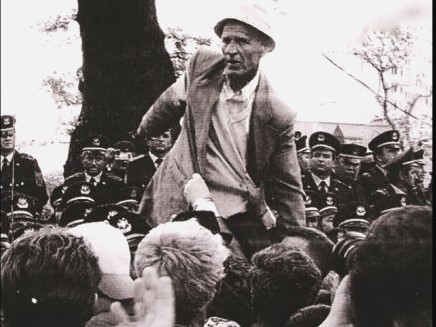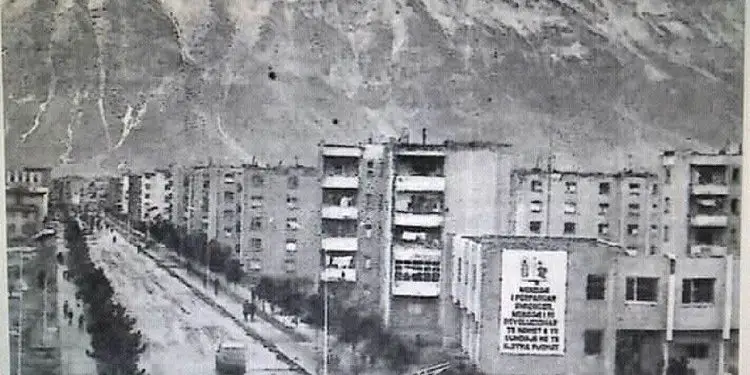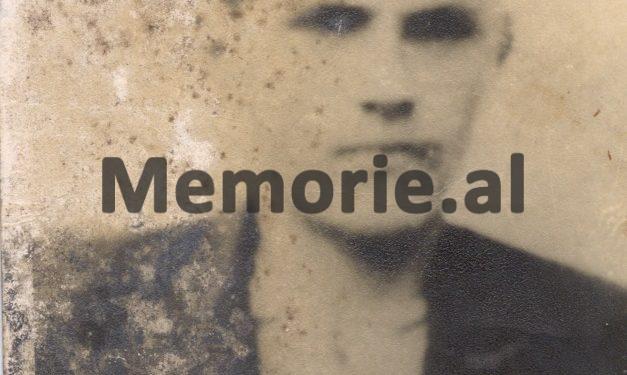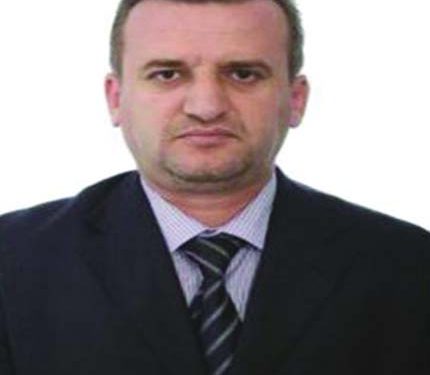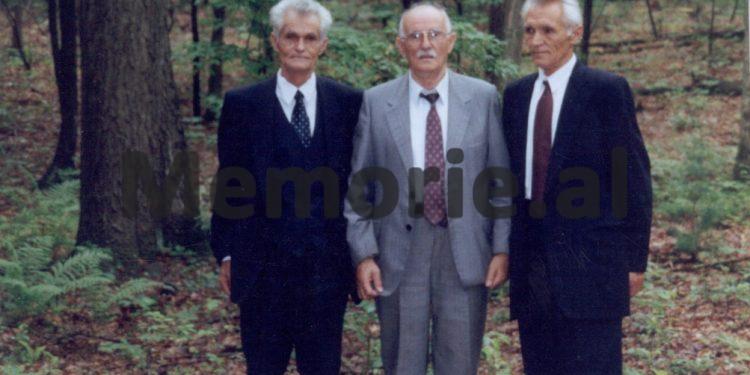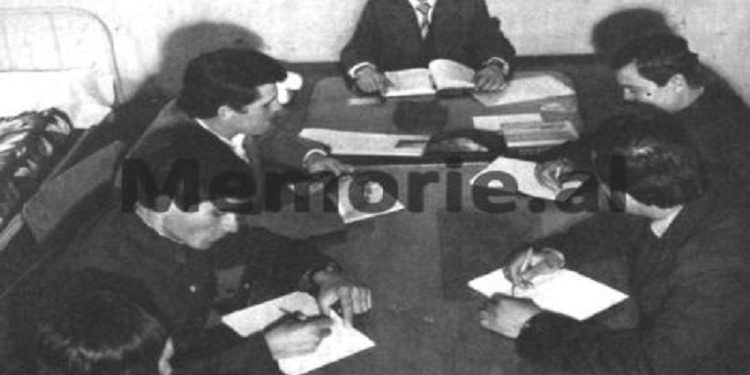By Dashnor Kaloçi
The Elezi family, the first initiators of the establishment of the PD branch of Kukes, since December 1990, Isa Elezi and Ardian Elezi, the first to announce the news of the establishment of the PD branch, with the support of their large family –
Memorie.al / Raif Elezi, scion of one of the largest families with a patriotic past in the Kukës district, which over the years has produced outstanding rifle men and prominent intellectuals who have worked and fought for the benefit of the Albanian cause. , like rarely other families in that area in the north-east of the country, spoke very little about his life and the ordeal of suffering during communism. He did not prefer to brag or occupy the podiums of the associations of the former persecuted. He did not raise his voice, even though he had more right than many others to demand his rights. He didn’t even speak, even when they “forgot” to give him compensation for the years of suffering, as he deserved it more than many others. His life, prison, suffering and resistance to communism, were worth more than any decoration or glory. It is difficult to summarize a man’s life in a few words.
If we have to talk about Raif Elez, we can’t forget that he is one of the rare people who was convicted by the communist regime before the 90s, accused of armed rebellion against communism, and even had a plan. specifically, how the country could be saved from communism. A radiologist by profession who realized that communism was an evil that he could not get rid of on his own. He is the character who devised the organization of an armed uprising and the violent overthrow of popular power.
Nothing benefited from the compensation for the former political persecuted, due to the absurd classification of the law, for the figure of punishment; “terrorism”. As we mentioned above, Raif Elezi never spoke about himself, and the interview that we publish below in this article was conducted shortly before he passed away and remains his only testimony, about his life, his family, his arrest, the investigation, the torture and his punishment and suffering in the prisons of the communist regime of Enver Hoxha and his successor, Ramiz Alia.
Mr. Raif, what is your family background?
The origin of our family is from Kukësi and we have been settled there since the time when that city was built. We come from a large patriarchal family with patriotic traditions, known and influential, not only in that area, but throughout the North of the country. Some of the most famous men of Albania, high personalities, such as; Abdyl Frashëri, or later Bajram Curri, Hasan Prishtina, etc., had our house as their center. They have come there several times, mainly in 1911, when the armed uprising was being prepared, which led to the declaration of Albania’s Independence in November 1912. In the Elez family, the head of the family, the main one was Bislim Elezi, followed by my grandfather, Xhem Elezi, Sul Elezi and others, because they were seven brothers. All of them always remain honest patriots and have participated in every war battle, both against the Turks and against the Serbo-Montenegros.
At the time of the Kingdom of Zogu, the grandfather was a deputy, while Mahmut Xhema (with a secular secondary school), served as a hojja. Our father, Rexhep Mahmuti, finished school in Shkodër, and later, attended a 4-year school in Lezhë, with some Austrians. From there, they took him to the director of forests in Elbasan. During the Second World War, the father, Rexhep Mahmuti, was sub-prefect of Kukës. His uncle, Reshat, was in the Royal Bird Guard and before the end of the war, sometime in 1944, he was killed by the Germans.
After the end of the war, was he declared a martyr?
They declared him a martyr of the motherland and removed him later, after arresting his father, Rexhepi. When the communists came to power in December 1944, our family was designed to be hit. The reason for this attack was the fact that we were a family of intellectuals and patriots, which the communists did not like. Baba Rexhep was removed from the post of sub-prefect and arrested in 1948. Uncle Reshat, who was killed by the German and whose name was named after a street in Kukës, had his name removed. The father was arrested on June 22, 1948, and the reason for the arrest was that he did not agree with the policy pursued by the communist regime in power.
Now to you, how did your arrest happen?
The State Security, which had been following me for a long time, made a combination, sending me to Tirana with a service, ostensibly to get a tool for the radiology apparatus. When I reached Qafa e Mali, I was stopped by three vehicles in front of me, in which there were several officers with guns. I knew one and got physical with him, bumping into each other. During the fight, he told me: “don’t move, you are arrested in the name of the people”. I replied: “And in the name of which people are you arresting me? You are arresting me in the name of yourself and your politics”? What is the truth, I was not with any social or political organization of that time. In 1953 , they asked all of us young people to enter the youth, and I did not accept. In fact, I spoke against the regime, for those things that I considered unjust.
What exactly were you talking about?
Yes, I have said several times: “what is happening like this, these people have no bread to eat”. And so it was, since people with the income they received per day, did not go out for a pack of cigarettes or a match. In a word, it was extreme poverty. Well, back to the arrest. After handcuffing me, they put me in a car and took me to Kukes prison. That’s where the serious investigation began, which lasted a full 19 months. They interrogated me, of all kinds. They told me that I insulted the party, that I wanted to make the people unhappy, etc., etc.
“No, – I told them, – I said that the people are unhappy, because there is no bread to eat.” They asked me: “Who told you that?” I answered them; “They get 22 lek a day for cigarettes, but where do these people eat”? Since I was speaking before the arrest, provocateurs were sent to my house to see what was being said to me. And after my arrest, they exiled our whole family (all the married brothers with their children) to Dumre in Elbasan, where they suffered for years, in the hardest jobs.
How were you treated during the investigation, which you said lasted 19 months?
The treatment was inhumane. Beating in a barbaric manner, yes, but they also left us submerged in water, so that for 22 days in a row, our clothes have not dried. The investigation took place during the day and throughout the night. Since they had planned to attack our family, they also accused me of some other things, as if I had wanted to kill some people. I answered that it is not true, because if I had wanted to kill them, I would have killed them and they would not have been able to stop me. My investigation continued in Kukës, for about a year or so, and then they took me to Tirana, for the reason that they tortured me in a barbaric way, since I did not accept the charges.
What else were you accused of?
During the investigation, they told me that I wanted to overthrow the people’s government with violence, and I replied: “Yes, I wanted to overthrow it with violence, because without violence freedom cannot be obtained.” I had said this before the arrest, with a work colleague, when he expressed an opinion to me, and I expressed myself openly, telling him that; “If we organize with 100 powerful people, first before the light comes out, we attack the Internal Branch, the Party Committee, the Executive Committee, the military departments, etc., taking them all under control. And then, with what is happening in Kukës, I spread it through Radio-Kukës, throughout Albania. This is the only way to bring down the government, because there is no other way.”
But this conversation came out and I was arrested for this work. Many, many people have been arrested after me, but not for my work, but for creating a group, because if it was a group, you would be punished more.
When did you go to court and where did it take place?
In March 1970, I appeared in court and the court session took place in the Kukës cinema, which was full. The trial was demonstrative, as all the people were brought out to the “Skënderbej” square and, in the streets of the city of Kukës, following him with loudspeakers. In the trial together with me in the dock, there were 7-8 people others.
Were you related to those people?
In order for the people to believe the accusations against me, they had found some close people who were related to me by blood. As for the others, who were accused in that group, I knew that they were processed by the State Security, willingly or unwillingly. I, in the courtroom, did not accept the charge. Another thing was added to the accusation, apart from the fact that I had called for an armed uprising, accusing me of being an assassin, while that of agitation and propaganda was already known.
Why were you accused as an assassin?!
They accused me of wanting to kill a party secretary, but I told them I didn’t remember. I did not accept the charge, but others did. I accepted only what I had spoken against people’s power, but not the call for armed insurrection. The trial continued for four consecutive days, morning and afternoon. In the courtroom, there were many witnesses and one of them was a health worker, who addressed me directly with contempt: “You insult the Party here once again, as you insulted it.”
The accusation was very serious, and this one was weighing me down even more, and they were waiting for me to explode, but I didn’t give myself up. In the same way, during the trial, the president Shefqet Muçi said to me: “Why did you carry a revolver”?! “To kill you”, I replied. The presiding judge was provoking me, so that I would get angry, and I gave him the last word.
In conclusion, how much were you sentenced?
The decision was given to me; 21 years and some months, because I don’t remember exactly. I said the last word; “protest”, while others accepted it. I asked for an appeal and the appeal came after three months. It was a final decision, given by the Kukës court.
After the trial, where were you taken to serve your sentence?
After some time, they took me to Burrel prison and left me alone in a room, with extreme conditions, and I stayed there for 13 years in a row. Afterwards, I had five Catholic priests there, who told me; “thank you for escaping the bullet”.
Who else did you have as fellow sufferers in your cell?
Later, they brought me and Pjeter Arbnor to my room, with whom we talked against the government, without being afraid of each other. They often took me and took me to the dungeon, to torture me, so that all the prisoners realized that they wanted to eliminate me physically, in the dungeons. Around 1977, I was taken to the interrogator for the second time. They enter my room from ten o’clock in the evening. I tell them it was a break, and I refuse to go to the investigator.
They took me by force and took me to the dungeon, where there were about 13 people. During the time they take me to the dungeon, they say to me: “You don’t know this power?” I answer them: “I neither know it nor do I want to know it. Worse than eating human flesh, what do you have to do? Then go on.” After that, they tortured me, they left me unconscious that night on the floor, and they took me the next day, and took me to the dungeons of Burrell. I was in pieces, I had three broken ribs. They brought me there in two I found out that one of them was an investigator, and I didn’t know who he was. I told them: “I want the president of the court, the legal expert and the prosecutor to see my condition, otherwise I don’t agree to say a word.” .
How did they answer?
They told me: “The president of the court is on duty, the doctor is not here.” They didn’t ask me anything, because I was broken, but they had concocted a plan to accuse me of allegedly hitting the policemen. But he was a fool of them, as it would not be believed in court, because there were 13 of them, and I would never be able to hit them with my hands tied. But they did their job and took me to court.
And after that, were there other cases where they mistreated you?
Yes, after 21 days, I was tortured again, so much so that several other prisoners also noticed. One of them is Spartak Ngjela, who told them: “What are you doing like this, why are you beating him for nothing”?! Even Spartacus said; “I will pursue the matter of Raif Elez legally up to the top…”! After that, Spartak was deported and taken to the cells of the “revisionists”. As we used to say in Burrel.
Meanwhile, they come and tell me: “You complained”?! “Yes, – I tell them, – I have complained, but it seems to me that someone else has also complained about my case and both of these complaints, I ask to be taken to the Prosecutor’s Office”. They told me: “The person who complained is not here.” “Go and take it where you want,” I told them, letting them understand that it was Spartacus. They left this matter in silence as well. In 1987, they tortured me again and sentenced me to solitary confinement in dungeons, to eliminate me physically.
How did it happen?
While I was entering the canteen, I was told: “Raif Elezi comes out a bit.” I came out… they put the irons on me and took me to Kukës. They fell from Dibra. I saw that they wanted to kill me without a trace, that they stopped the car and left it behind a tree. I did not give myself, thinking that my work was seen. After a few minutes, they took some fruits (it was August) like wild plums and apples and we started again. They took me to Kukës, where two investigators, whose names I did not even know, were waiting for me.
When they asked me my name, which meant that the investigation was restarting, I immediately attacked them. They kept me there for 18 days in a row and when they saw that nothing was happening, they sent me from Kukësi to Burrel. When I returned to the cell, the other convicts asked me what was likely and I told them that they had accused me once again, for the first charge. It was 1990 and I was still in prison….!
When were you released from prison and how do you remember the day of release?
I was released on January 26, 1990. I saw release from prison as a dream, as I considered myself dead. It was a dream, a dream. After traveling in a truck at night, I went straight home.
Were they waiting for you at home, or did they not know that you were being released?
No, they knew, because I had sent my brother to tell them. I entered the house at half past 12 at night. They had expected me dead, and so began the wailing of joy. They could not believe their eyes, that after 22 years of continuous imprisonment, I returned home alive. During those days, I also learned many things, not least serious, that had happened to my family and my brothers, things that I had not known before, because I had been isolated in the Burrell prison.
After you were released from prison, what did you do?
After a while, I entered and worked as a porter. Then the political changes started and I felt that something was going to happen. In December 1990, our entire Elez family was involved in the system change and the democratic movement. Many members of our family, my brothers and their sons, participated in the establishment of the Kukes Democratic Party branch. One of the founders was my brother, Isa Elezi, who was elected vice president of the Kukës PD branch, and my nephew, Ardjani, Dauti’s son. Another cousin, Besnik Elezi, was the secretary of the branch and several others in its leadership. Memorie.al




